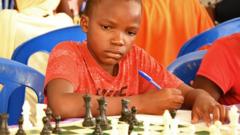Recent cuts to U.S. foreign aid have severely impacted Uganda’s L.G.B.T.Q. community, exacerbating existing struggles for support, medical care, and safety in a hostile environment.
U.S. Aid Cuts Intensify Struggles for Uganda's L.G.B.T.Q. Community

U.S. Aid Cuts Intensify Struggles for Uganda's L.G.B.T.Q. Community
The dismantling of U.S. foreign aid programs has left Uganda's L.G.B.T.Q. population in dire circumstances as they confront heightened discrimination and violence.
In a climate where Uganda's L.G.B.T.Q. community faces severe discrimination, the dismantling of U.S. foreign aid has deepened their plight. After President Trump signed an executive order cutting United States Agency for International Development (U.S.A.I.D.) funding, many activists are reporting a spike in desperation among those affected by the oppressive legal framework in the country.
Andrea Minaj Casablanca, a peer educator and counselor for an L.G.B.T.Q. support program in Kampala, has seen an influx of people pleading for H.I.V. medications, therapy, and shelter amid a leadership transition in international aid policy. "Our whole world has been turned upside down," said the 25-year-old transgender woman. As critical funding disappears, concerns grow about how to support vulnerable individuals losing access to essential services.
Over the years, Uganda has witnessed a sharp increase in measures against L.G.B.T.Q. individuals, with President Yoweri Museveni enacting a law that imposes life imprisonment for engaging in same-sex relations. The current aid cuts have aggravated the situation, with shelters struggling to maintain operations, job losses across NGOs, and increased reports of mental health crises among L.G.B.T.Q. individuals.
As the U.S. aid cuts take effect, support networks are running short of essential resources, with vital medical supplies dwindling and many facing heightened risks of violence and despair. "The support was never enough, but now it feels like we are completely abandoned," Casablanca emphasized as she continues to navigate this uncertainty, feeling the weight of the community's needs grow heavier by the day. The urgent cries for help echo through the corridors of a society grappling with the intersection of poverty, prejudice, and the dire consequences of international political decisions.






















